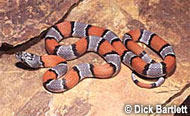Description:
The gray-banded kingsnake is a highly prized, moderately sized snake. Cages should be escape proof, complete with water and hiding area. Kingsnakes and milksnakes should be housed separately (except during breeding season, of course) because they are cannibalistic. Inexpensive enclosures such as plastic shoe or sweater boxes work well if there are ventilation holes drilled in the sides. Aquariums or homemade enclosures also work well if you want to display the snake. A variety of substrates may be used (aspen shavings, corn-cob-type rodent bedding or newspaper) to keep the animals clean, warm and dry. The gray-banded kingsnake will feed on a variety of prey items. They will consume rodents as well as cold-blooded prey such as lizards and frogs (in addition to other snakes). Young, captive-bred gray-banded kingsnakes can be reluctant feeders and do best in the hands of experienced keepers. This species should be kept between 80 and 85 degrees Fahrenheit. Temperature control is important, as it maintains feeding response and digestion. For more information, read our detailed gray-banded kingsnake care sheet.
Habitat:
Mountainous, cliff dwelling snake.
Range:
Throughout southwestern Texas and northern Mexico.
Scientific Name: Lampropeltis alterna
Species Group: kingsnake
Family: Colubridae
Size: 4 feet
Level: beginner
Weight:
Dangerous: No



